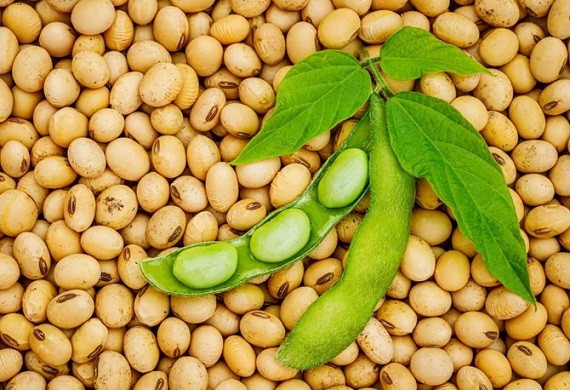Nikhil Prasad Fact checked by:Thailand Medical News Team Feb 09, 2025 2 months, 4 days, 6 hours, 49 minutes ago
Medical News: Scientists Discover a Natural Compound with Antiviral Properties
Researchers from Southern Medical University and Jinan University in China have found that daidzin, a natural phytochemical compound extracted from soybeans, has the potential to combat dengue virus infections. Dengue, a mosquito-borne disease that affects millions of people worldwide, has no widely effective antiviral treatment. This discovery brings hope for a new therapeutic option that could target the virus in its early stages of infection.
 Daidzin from Soybean Shows Potential in Fighting Dengue Virus
Daidzin from Soybean Shows Potential in Fighting Dengue Virus
Daidzin is a type of isoflavone glycoside commonly found in soybeans. Known for its health benefits, including anti-inflammatory and antioxidant properties, it has also shown antiviral effects against various viruses. In this
Medical News report, researchers explored whether daidzin could work against dengue virus and discovered that it effectively reduces viral load by interfering with the virus's ability to enter and infect cells.
How Daidzin Works Against the Dengue Virus
The study focused on dengue virus serotypes 2 and 3, which are among the most widespread and dangerous strains. Experiments were conducted using different cell lines, including human liver and kidney cells, to understand how daidzin interacts with the virus. The researchers found that daidzin mainly acts during the early stages of infection by blocking the viral envelope (E) protein. This protein is essential for the virus to attach to and enter human cells.
Through advanced molecular docking techniques, the team demonstrated that daidzin binds directly to the dengue virus E protein, preventing it from interacting with host cells. Surface plasmon resonance (SPR) experiments further confirmed this interaction, showing that daidzin has a strong binding affinity with the viral protein. This means that the compound effectively blocks the virus before it can spread within the body.
Additionally, two innovative methods, the cellular thermal shift assay (CETSA) and drug affinity responsive target stability (DARTS) assay, were used to validate the binding of daidzin to the E protein. The results showed that the compound significantly stabilized the E protein, confirming its role as a direct antiviral agent.
Disrupting Viral Infection and Protecting Cells
The study also explored how daidzin affects the interaction between the dengue virus and heat shock protein 70 (HSP70), a cellular protein that the virus relies on to infect host cells. Immunofluorescence assays revealed that in infected cells, HSP70 moves from the cytoplasm to the cell membrane, facilitating the virus's entry. However, when cells were treated with daidzin, this interaction was disrupted. Co-immunoprecipitation (Co-IP) experiments confirmed that daidzin prevented the binding of HSP70 to the viral E protein, further inhibiting the virus's ability to enter human cells.
The experiments demonstrated that daidzin significantly reduced the viral RNA and protein levels in infected cells.
Cells treated with daidzin showed a lower viral load compared to untreated cells, with up to a 96.7% reduction in viral activity at high concentrations. These results suggest that daidzin not only prevents infection but also reduces the severity of the virus’s impact.
The Future of Daidzin as an Antiviral Agent
With dengue infections continuing to rise globally, there is an urgent need for effective treatments. Current antiviral drugs and vaccines have limitations, with some showing reduced effectiveness against different dengue serotypes. This study highlights daidzin as a promising natural compound that could be developed into an antiviral drug.
Since daidzin is derived from soybeans, a widely consumed food source, it is expected to have low toxicity and good safety levels. Researchers believe that modifying daidzin’s chemical structure could enhance its antiviral properties while minimizing potential side effects. Additionally, combining daidzin with other antiviral drugs may improve its effectiveness in treating dengue infections.
However, further research, including animal studies and clinical trials, is needed to determine the compound’s safety and efficacy in humans. If successful, daidzin-based treatments could provide a natural and accessible solution for dengue virus infections, benefiting millions of people in affected regions.
The study findings were published in the peer-reviewed journal: Industrial Crops & Products.
https://www.sciencedirect.com/science/article/pii/S0926669025002043
For the latest Dengue News, keep on logging to Thailand
Medical News.
Read Also:
https://www.thailandmedical.news/news/individuals-previously-exposed-to-covid-19-with-sars-cov-2-igg-antibodies-will-develop-severe-dengue-when-infected
https://www.thailandmedical.news/news/carica-papaya-leaf-extract-for-dengue-treatment
https://www.thailandmedical.news/news/antioxidants-and-the-future-of-dengue-care
https://www.thailandmedical.news/articles/dengue-news
https://www.thailandmedical.news/articles/herbs-and-phytochemicals
